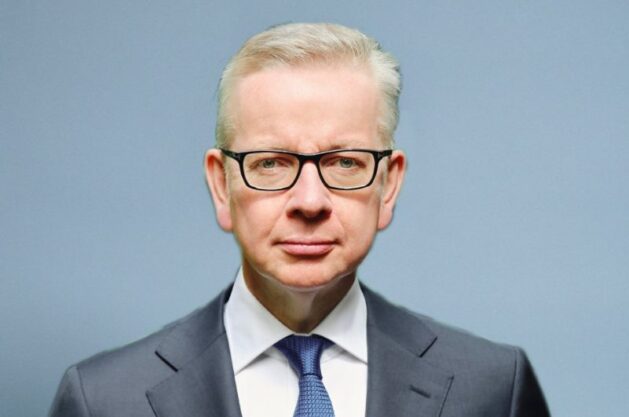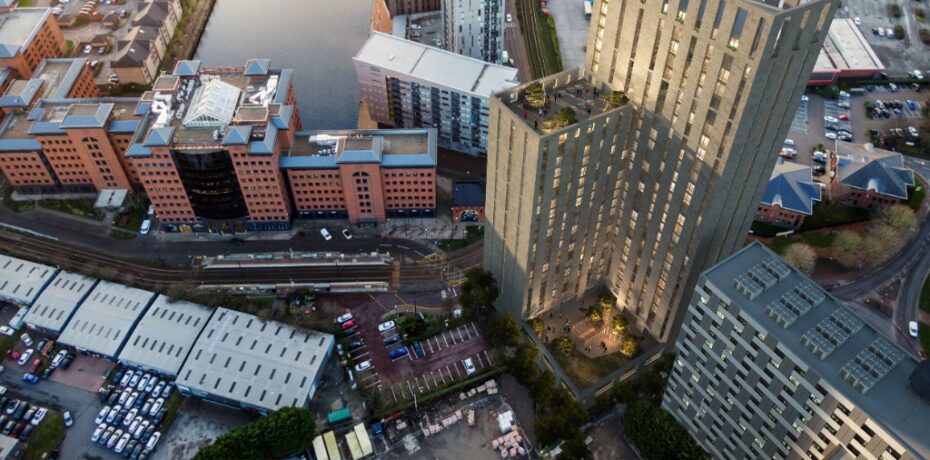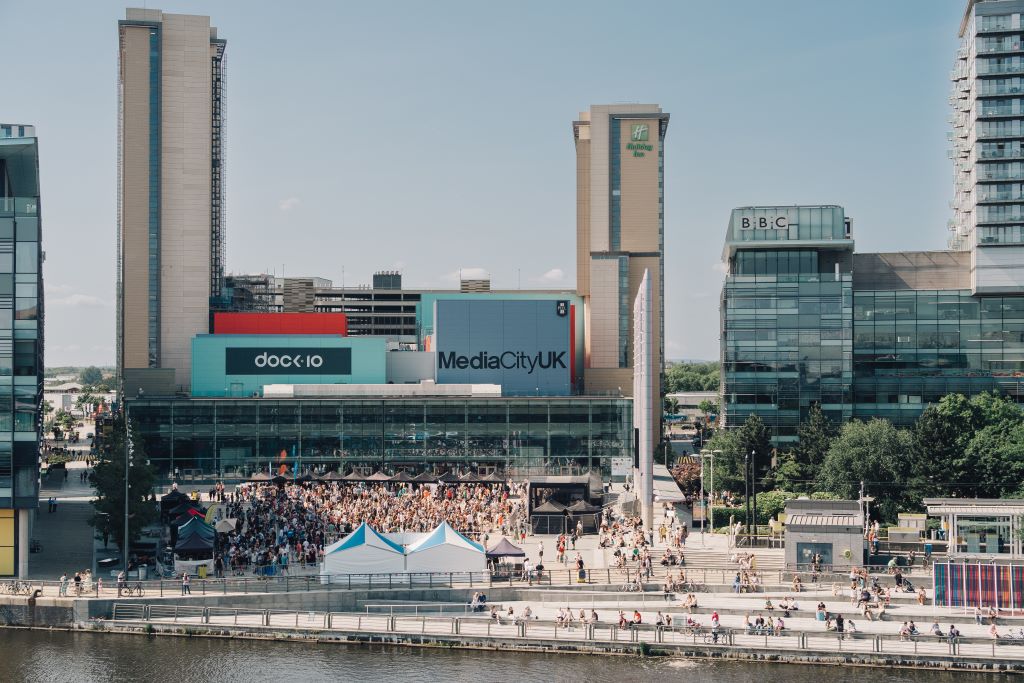The Subplot
The Subplot | What Gove’s on about, diplomats, Americans
Welcome to The Subplot, your regular slice of commentary on the North West business and property market from Place North West.
THIS WEEK
- Michael Gove on Levelling Up: the policy gets a bit clearer, maybe
- Americans Heart Manchester BTR: local build-to-rent’s latest fans
- Diplomatic Bags: why consulates are hot properties

GOVE SAID WHAT, EXACTLY?

Credit: via MHCLG Attribution 3.0 Unported (CC BY 3.0) https://www.flickr.com/photos/mhclg/51482193403/in/album-72157691123547041/
Making sense of levelling-up
Michael Gove’s Conservative conference comments about levelling up – and whether Oldham can learn from Wigan – puzzled and angered some observers. But were last week’s remarks a clue to what levelling up really means?
It is barely a month since Michael Gove became the new Secretary of State for Levelling Up, Communities and Housing. Gove’s mission is to explain what levelling up is, an overdue task more than two years after prime minister Boris Johnson announced that it was his central domestic policy target. Speaking at a fringe event at last week’s conference in Manchester, Gove may have given us a clue.
Context matters
Gove was answering a question about education from Rachel Wolf, co-author of the 2019 Conservative manifesto. The Manchester Evening News reported him saying that his task was to “better understand which towns around Manchester are succeeding and why”. He then added that although Manchester was doing “very well”, in Oldham “people still leave, and it has not risen to the same extent with the tide”. In fact, the “broader economic, educational infrastructure in Oldham, [is] not so good”.
All politics is local
The Secretary of State went on to talk about a legacy of poor housing and community tensions in Oldham. He asked why local leadership in Oldham wasn’t looked at more closely, and remarked that Wigan enjoyed successes that weren’t happening in Oldham. His final point was that “it’s not sufficient to say, the rising tide of Manchester will lift all of the boats in Greater Manchester and around it, but it is important to look and have specific solutions for what is happening in each of those towns”. In other words, local factors count too.
Bruising encounters
Politics in Oldham hasn’t been healthy, and it’s possible Gove had this in mind. But the more nuanced take is that Gove was trying to work out if the long-standing policy of growing Greater Manchester’s economy by focusing on the city centre was, in fact, a success. It’s a good question (see Subplot, 8 June 2021).
All boats rise a bit
Academics are working on some answers but the evidence seems to show that, generally speaking, investing in the “regional centre” has done a power of good for the three central boroughs – City of Manchester, Salford and Trafford. It has also generated a less substantial but still significant output for everyone else. Tom Forth’s analysis shows how sharply income growth has concentrated in the central boroughs, and simultaneously that the gap between the poorest and wealthiest boroughs has narrowed. Everyone has got richer, only some got richer quicker.
Retail problem
From the point of view of property-based regeneration if Oldham has struggled with outcomes, it’s not for want of trying. The Princes Gate saga makes the point. Marks & Spencer signed up in 2014, pulled out in 2016, and the council had to pick up the pieces. Lidl and Travelodge are now signed instead and everything’s moving ahead. Earlier this year Oldham Council bought the 450,000 sq ft Spindles shopping centre, paying £9.5m, and has an ambitious town centre investment plan (Subplot, 23 February). The Spindles plan is now out for consultation. You can hardly accuse the council of sitting on its hands.
And yet
But you might say that ‘Wigan was quicker’. They too had a 440,000 sq ft shopping centre to deal with and, in December, Wigan Council chose a joint venture partnership between Cityheart and Beijing Construction Engineering Group International to lead the £130m redevelopment. The Galleries scheme goes before planners next month, key tenants are signed up, and funding agreements are being finalised (there’s no Chinese money involved, say the JV partners).
Wigan’s big plus
The Galleries will now include a six-screen cinema, 464 homes, a bowling alley, a funky market hall, co-working, and small offices. Main site works will begin late 2022 for completion in 2025. This is the fulfilment of a council strategy agreed in 2019. Cityheart’s Warren Taylor says Wigan was “incredibly proactive”. But Taylor also concedes that Wigan has the advantage of being out on a limb, commercially speaking, in contrast with Oldham where development has to jostle with potentially conflicting schemes, opportunities, land values and catchments in Rochdale, Tameside and the monster economy down the road in Manchester.
Back to the beginning
Or are we missing the point? Gove was responding to a line of enquiry about education and skills, and maybe the message from Gove’s remarks is that to focus on physical regeneration is to put the cart before the horse. Skilled and educated populations attract new buildings, unskilled ones do not. If this is the message, then Gove is onto something. The last big city-region study showed that Oldham children are the least likely of all the 10 boroughs to have attained a reasonable level of development by the age of five, while Wigan is in the top three. Factor in levels of deprivation, and Oldham is still doing worse than it ought to. Oldham was eighth out of 10 boroughs at key stage two… and so on. You get the idea.
Big picture
According to a high-powered 2019 review “divisions within Greater Manchester are more pronounced than divisions between Greater Manchester and the rest of the country”. For example, 55% of 19-year-olds are qualified to Level 3 in Salford, compared with 77% in Trafford. The data shows big differences between localities even when economic disadvantage is not an issue. So Gove is certainly on to something here.
Oldham welcomes Gove
Cllr Arooj Shah, leader of Oldham Council since the defenestration of her predecessor in the May elections, is by no means hostile. She didn’t appreciate what looked like an unfriendly comment on local leadership, and if the Gove speech did preview an education-and-skills themed levelling up then Shah is on board.
Let’s talk
“I wasn’t offended by much of what he said. He wasn’t wrong, he was trying to understand,” she says of the education comments. “What we need now is a genuine conversation. We need to be in a room together. And to understand that each borough has its own challenges.” Oldham’s new economic review board met for the first time last week, bringing together public and private sectors. Hopes are higher, and would be higher still for a little more government participation.
Also trains
Gove’s remarks had one final message: he stressed how important transport was. It’s no good having a skilled workforce if they can’t get to the jobs. Boris Johnson is famously attracted to big-ticket projects and if one were trying to join up to dots, you’d probably start looking at transport infrastructure projects. The Northern Powerhouse Rail initiative failed to get the expected big mention in either the Johnson or Gove conference speeches. Maybe this is one to watch.
Conclusion: Gove seems to be telling us that levelling up is about skills and transport, and not so much about physical regeneration. Or is he?
DRIVING THE WEEK
Lots of Americans!
Boston-based Taurus Investment Holdings has become the latest US investor to make its debut in Greater Manchester. A £45.5m facility to support Cole Waterhouse’s 29-storey Anchorage Gateway shows the build-to-rent bandwagon still has a long way to roll.
Taurus, a global private equity firm from Massachusetts, chose Salford for its first UK punt. Together with Cole Waterhouse and its UK partner Rowan Asset Management, it has agreed a £45.5m finance facility with Fortwell Capital. It will support a 290-unit build-to-rent scheme at Salford. Taurus are big – $8bn big – and their vote of confidence in North West BTR will gladden many hearts.
Pause, then fast forward
The deal comes after a thinnish few months for UK BTR as the more risk-averse investors wait to see how post-pandemic life (and the pre-pandemic surge in development starts) works out. CBRE calculates that just £374m was invested in Q3 2021, down by a jaw-dropping 76% on the same period last year. The £73m forward funding of The Castings in Manchester by CDL and Baring’s acquisition of The Trilogy, Manchester, for £53.5m, did a lot of the heavy lifting. Year-to-date the total is £1.92bn, down 28%, but a further £2.9bn is under offer. CBRE concludes, reasonably enough, that by 31 December things will look much like they did in 2020.
Look west
The big unknowns all start in the US. Notice funding entrants, like Taurus, and self-confessed disruptors such as US co-living and BTR operator Common. Common, based off Madison Avenue in New York, has now confirmed what Subplot reported two weeks ago, and will make its Manchester debut in spring 2022. Expect 200-300 units in the first scheme, which will take the form of an operational agreement with an existing developer-landlord. What makes Common interesting is the clear brand, and the equally clear intention to mix co-living with standard BTR, as is usual in the US.
Conclusion: If the money is there to back it, this blend could put extra rocket fuel in the North West beds-for-rent sector.
IN CASE YOU MISSED IT…
 How many diplomats are there in Stockport?
How many diplomats are there in Stockport?
The pub quiz question to end all pub quiz questions. In fact, there are two honorary consuls in Stockport (Belgium and Finland). Diplomatic property in the North West was once a joke, but isn’t any more, as a deal with Turkey shows.
A Turkish consulate will open in Manchester, occupying 4,000 sq ft at 6 Oxford Court. The building has been empty since 2018, so the signing by Carnarvon Street Properties is quite a coup. Late last year, the Italian consulate took 6,800 sq ft at Topland Group’s 50,000 sq ft Chancery office building in the city, joining the Spanish consulate to create a 17,500 sq ft diplomatic hub. The Italians move into town after a period in Ardwick. Expect more deals like this as overseas governments beef-up their UK regional representation in an attempt to help their citizens (and traders) after Brexit.
Corps diplomatique
The North West diplomatic community is far from negligible. Only London has more full-time diplomats than Manchester, which has 13 (or 14) missions, meaning consulate generals or assistant high commissions. Add the Turks and it will soon have 14 (or 15). The hesitancy about numbers is due to France, which only has an honorary consul, one rung down the diplomatic ladder, but on the plus side does have a proper office at the Alliance Francaise. Since you ask the full list is: Italy, Spain, Romania, Pakistan, Libya, Poland, Hungary, the Czech Republic, Iraq, Ireland, Portugal, China and Bangladesh.
Honorary consuls
The world of North West honorary consuls is more fun. The Swiss are camping out in Altrincham, the Danes and Icelanders are in Prestwich, and Brazil is in a block of flats in Salford not far from the Mexicans who are also in Salford, operating from an office in Weaste.
Liverpool too
Iceland can also be found in Ormskirk, and there’s a Danish honorary consul in Burscough, while Sweden is in the Port Authority Building and the French, always chic, have an address in Liverpool Cathedral itself. You can find the Royal Thai honorary consul on Lord Street and Liverpool’s Spanish representative is in Wavertree. The Germans chose to ignore the North West entirely – you’ll need to go to Leeds for them. The Russians are in Manchester (a small passport office) but it doesn’t appear on the diplomatic lists, which you can find here.
The Subplot is brought to you in association with Cratus and Oppidan Life.






Wigan gets a direct link to HS2 too, not heard anything about how that’s going to work, is it just a merge-on to WCML or do they get some station development?
By Rich X
HS2 – interesting thought – the HS2 page is far from encouraging though: https://www.hs2.org.uk/stations/wigan/
By David Thame
“And Liverpool too…” is a missing part of the equation re Gove’s speech and whether Manchester at all costs is worth it.
Despite dogged refusal to admit it by some, metropolitan Liverpool is not so much smaller than Manchester and yet its population is being expected to get by with what its got. Often complicated by economic value being abstracted away…
I’d agree with any notion that levelling up means focusing on where people actually live. Of course though, the leaked HS2 plans really signify that no matter what Gove says there are those in government who want business as usual.
By Jeff
Liverpool has been put to the back of the queue for a long time. For the future of Liverpool and the children of Liverpool we want HS2.
By Mary Malarkey
Greater Manchester population – 2.85 million
Mersyside population – 1.42 million
Can’t see how they’re similar at all to be honest. GM is over 50% larger than Merseyside.
By Anonymous
It’s Liverpool City Region( population about 1.6m), the main point is about the amount of freight traffic that is moving on the railways from Liverpool and it’s trade with more and more ships using the port. From a logistical view if extra capacity is not made available, the recent lorry drivers shortage problems will be minute in comparison to the delays in goods being distributed to the rest of the country. We are a global port and it is best to be non-parochial in national strategic planning, plus we need HS2 so we are not marginalized by this, we even offered(Liverpool) to pay for the link to the City ourselves but the Government refused to talk to us?
By Connectivity for all
Looks like Manchester will just scrape under the bar with HS2, and everyone else will get shafted. Liverpool doesn’t get any more capacity, but will get significantly improved journey times from Crewe downwards (ditto Preston), just thank your stars you aren’t east of the Pennines, or poor old North Wales, which isn’t even electrified, so I’m guessing gets FA.
By Rich X
Rich X is spot on with his assessment. If this is done on the cheap, it will be pointless. NPR will serve Leeds but not Bradford. What ridiculous economic illiteracy is that! That is like Reading not having a station on the Bristol to Paddington route.
By Elephant
Liverpool will be served by HS2
And Re. populations, add Birmingham to the Liverpool City Region and it still would be less than GM
By Dave
Interesting comments, given my points. Not sure if they confirm what I’m saying, or just suggest there is no hope??
Do I point out how overwhelmingly, centre focused, contiguously urban LCR is, with only one anomaly, versus a county that contains far flung towns like Rochdale, Bolton, Wigan and Stockport?
Or do I just ask at what level of population does a metropolitan area become non-existent and disposable to this crowd? 2m? 1.6m? 1.4m?…
By Jeff
You only need to look at the capacity on the trains departing from Liverpool to Manchester in the mornings compared to the empty carriages from Manchester to Liverpool to understand which city is the key economic driver in the region.
By Big Dub
Assuming that’s true @bigdub that would serve to underline my point that economic activity in our own metropolis needs to be stimulated. As it has been elsewhere.
Of course what you’re referring to, if it exists, may simply reflect that people in Liverpool use trains to get about its own metropolitan area more (ORR statistics 2019 circa 100m metropolitan rail journeys inside Liverpool CR, vs 50m within GM)…
Are you sure yours is bigger than ours? Or is what you do with it that matters!
By Jeff
@Dave, Birmingham has about 3 million in its metro area, you simply cannot have one rule for one and an inflated view of another. Mind you it’s Manchester the most important city in the world and everyone else is inferior according to the comments on here;)
By Level playing field.
LPF, Birmingham, the largest local authority in Europe, with approximately 1.15m people, is what I was referring to. Stick that into the Liverpool City Region and you might start getting close to the numbers in GM.
By Dave
Quite a few size queens… Maybe we need to look into this one day. Why do so many think it’s the population to be found within arbitrary local government boundaries that matters rather than economic snd cultural power – alas harder to measure but clearly more significant?
By David Thame